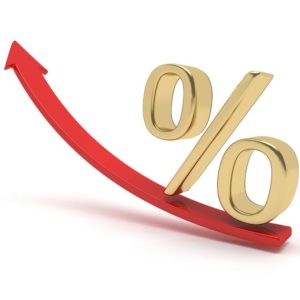Based on their belief that the U.S. economy had strengthened, the Federal Reserve on December 16, 2015 made the decision to hike their interest rate from zero to .25 percent. This rate is the interest rate at which a depository institution lends funds maintained at the Federal Reserve to another depository institution overnight. The Federal funds rate is generally only applicable to the most creditworthy institutions when they borrow and lend overnight funds to each other. In spite of being so restricted a market, it has a great effect through the loans of these lending institutions to the rest of the U.S. and even to the Global economy.
While this is a very small increase, it must be remembered that this is the first increase since 2008. This small increase does indicate that future policy tightening, i.e., increasing interest rates, will likely be very measured and will be governed by the future U.S. and global economic outlook.
An Inevitable Increase
The present situation had to change eventually as zero interest rates have crushed conservative savers and continues to reward risk takers which can easily lend to speculative bubbles in asset values. Retirees especially have seen their returns on savings accounts, certificates of deposit, and high quality bonds decline to almost insignificant values. Speculators have been able to borrow at very low rates, via leveraging their funds, to purchase riskier securities and to force their prices to often unrealistic values. This phenomenon of rewarding speculation at the expense of conservative savers is known as Financial Repression.
However, balanced against a relief for savers are the areas of the U.S. and Global economies which will be negatively impacted and are the reason for caution by the Fed. In the U.S. the stronger dollar, as a result of global funds coming to the U.S. for higher return, will make U.S. products more expensive in foreign countries. This can reduce the amount of and profitability of U.S. exports. Furthermore, higher borrowing costs as a result of Fed tightening together with increasing wages, as quality help is becoming scarce, will further impact business returns.
The Global Impact
Internationally, the emerging market countries have already been hit hard by the slowing growth of China (a major market for them) and by the precipitous decline in commodity prices, i.e., iron ore, copper, oil, etc., which many of these countries have as their only major export. Added to this, much of their debt is denominated in U.S. dollars. As the U.S. dollar strengthens as a result of the Fed rate increase, their currencies decline making it harder for them to pay interest and to pay back their debts.
In contrast to the emerging market nations, the more developed economies, i.e., Europe, Japan, and China, central banks are doing the reverse of the U.S. by lowering their rates and printing more money, i.e., quantitative easing. This may make their exports to the U.S. more competitive which will put pressure on the Fed not to further tighten as U.S. manufacturing is still struggling to revive and to be more cost competitive.
Next Steps
Therefore, in view of the above, it would be prudent to not rely too much upon the stated goal of the Fed to raise interest rates incrementally by 1% per year. Even though the U.S. has reached a further stage in the economic cycle than its major developed country peers, further tightening can only be done if the U.S. economy continues to achieve moderate growth.
For the future, professional active managers may be able to derive some benefit from market volatility. However, most investors should primarily stay in high quality companies that can better withstand higher interest rates and expected market volatility. Consumer related sectors, i.e., restaurants, retail, and home improvement should benefit from the stronger dollar and low energy prices. The financial sector will benefit from the increasing interest rates. In view of the present low threat of inflation, quality intermediate term bonds can also be considered.

Roger Small is a Senior Investment Advisor with Canon Capital Wealth Management. A U.S. Navy veteran, Roger earned his MBA from Harvard and is an accredited investment fiduciary.

